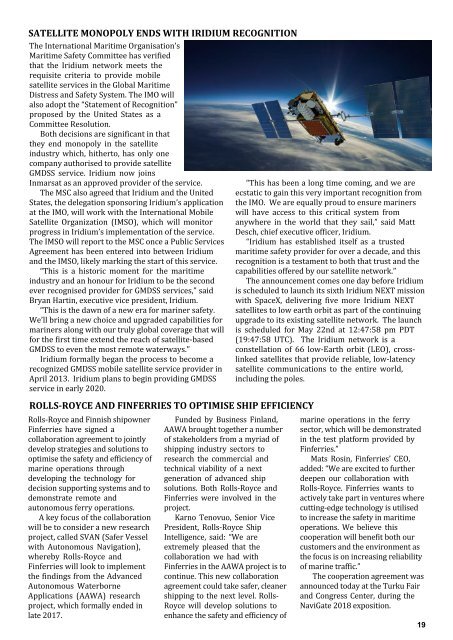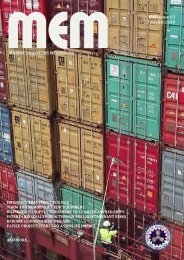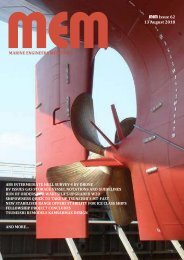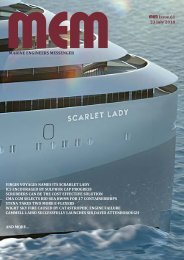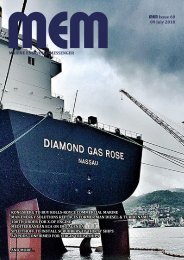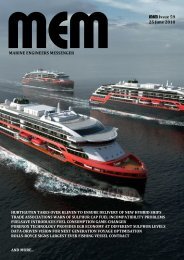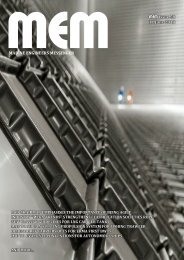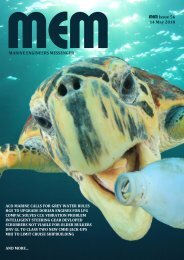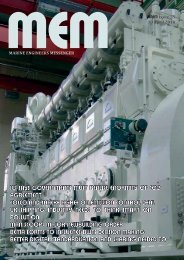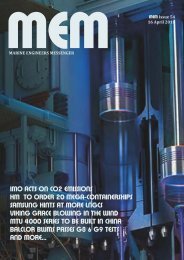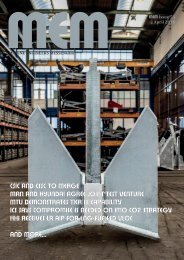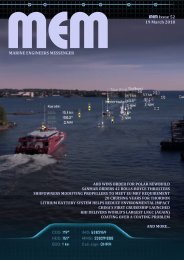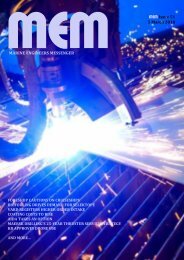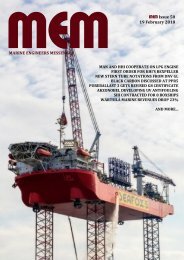MEM57
Marine Engineers Messenger, Volume 3 Issue 57.
Marine Engineers Messenger, Volume 3 Issue 57.
Create successful ePaper yourself
Turn your PDF publications into a flip-book with our unique Google optimized e-Paper software.
SATELLITE MONOPOLY ENDS WITH IRIDIUM RECOGNITION<br />
The International Maritime Organisation’s<br />
Maritime Safety Committee has verified<br />
that the Iridium network meets the<br />
requisite criteria to provide mobile<br />
satellite services in the Global Maritime<br />
Distress and Safety System. The IMO will<br />
also adopt the “Statement of Recognition”<br />
proposed by the United States as a<br />
Committee Resolution.<br />
Both decisions are significant in that<br />
they end monopoly in the satellite<br />
industry which, hitherto, has only one<br />
company authorised to provide satellite<br />
GMDSS service. Iridium now joins<br />
Inmarsat as an approved provider of the service.<br />
The MSC also agreed that Iridium and the United<br />
States, the delegation sponsoring Iridium’s application<br />
at the IMO, will work with the International Mobile<br />
Satellite Organization (IMSO), which will monitor<br />
progress in Iridium’s implementation of the service.<br />
The IMSO will report to the MSC once a Public Services<br />
Agreement has been entered into between Iridium<br />
and the IMSO, likely marking the start of this service.<br />
“This is a historic moment for the maritime<br />
industry and an honour for Iridium to be the second<br />
ever recognised provider for GMDSS services,” said<br />
Bryan Hartin, executive vice president, Iridium.<br />
“This is the dawn of a new era for mariner safety.<br />
We’ll bring a new choice and upgraded capabilities for<br />
mariners along with our truly global coverage that will<br />
for the first time extend the reach of satellite-based<br />
GMDSS to even the most remote waterways.”<br />
Iridium formally began the process to become a<br />
recognized GMDSS mobile satellite service provider in<br />
April 2013. Iridium plans to begin providing GMDSS<br />
service in early 2020.<br />
ROLLS-ROYCE AND FINFERRIES TO OPTIMISE SHIP EFFICIENCY<br />
“This has been a long time coming, and we are<br />
ecstatic to gain this very important recognition from<br />
the IMO. We are equally proud to ensure mariners<br />
will have access to this critical system from<br />
anywhere in the world that they sail,” said Matt<br />
Desch, chief executive officer, Iridium.<br />
“Iridium has established itself as a trusted<br />
maritime safety provider for over a decade, and this<br />
recognition is a testament to both that trust and the<br />
capabilities offered by our satellite network.”<br />
The announcement comes one day before Iridium<br />
is scheduled to launch its sixth Iridium NEXT mission<br />
with SpaceX, delivering five more Iridium NEXT<br />
satellites to low earth orbit as part of the continuing<br />
upgrade to its existing satellite network. The launch<br />
is scheduled for May 22nd at 12:47:58 pm PDT<br />
(19:47:58 UTC). The Iridium network is a<br />
constellation of 66 low-Earth orbit (LEO), crosslinked<br />
satellites that provide reliable, low-latency<br />
satellite communications to the entire world,<br />
including the poles.<br />
Rolls-Royce and Finnish shipowner<br />
Finferries have signed a<br />
collaboration agreement to jointly<br />
develop strategies and solutions to<br />
optimise the safety and efficiency of<br />
marine operations through<br />
developing the technology for<br />
decision supporting systems and to<br />
demonstrate remote and<br />
autonomous ferry operations.<br />
A key focus of the collaboration<br />
will be to consider a new research<br />
project, called SVAN (Safer Vessel<br />
with Autonomous Navigation),<br />
whereby Rolls-Royce and<br />
Finferries will look to implement<br />
the findings from the Advanced<br />
Autonomous Waterborne<br />
Applications (AAWA) research<br />
project, which formally ended in<br />
late 2017.<br />
Funded by Business Finland,<br />
AAWA brought together a number<br />
of stakeholders from a myriad of<br />
shipping industry sectors to<br />
research the commercial and<br />
technical viability of a next<br />
generation of advanced ship<br />
solutions. Both Rolls-Royce and<br />
Finferries were involved in the<br />
project.<br />
Karno Tenovuo, Senior Vice<br />
President, Rolls-Royce Ship<br />
Intelligence, said: “We are<br />
extremely pleased that the<br />
collaboration we had with<br />
Finferries in the AAWA project is to<br />
continue. This new collaboration<br />
agreement could take safer, cleaner<br />
shipping to the next level. Rolls-<br />
Royce will develop solutions to<br />
enhance the safety and efficiency of<br />
marine operations in the ferry<br />
sector, which will be demonstrated<br />
in the test platform provided by<br />
Finferries.”<br />
Mats Rosin, Finferries’ CEO,<br />
added: “We are excited to further<br />
deepen our collaboration with<br />
Rolls-Royce. Finferries wants to<br />
actively take part in ventures where<br />
cutting-edge technology is utilised<br />
to increase the safety in maritime<br />
operations. We believe this<br />
cooperation will benefit both our<br />
customers and the environment as<br />
the focus is on increasing reliability<br />
of marine traffic.”<br />
The cooperation agreement was<br />
announced today at the Turku Fair<br />
and Congress Center, during the<br />
NaviGate 2018 exposition.<br />
19


